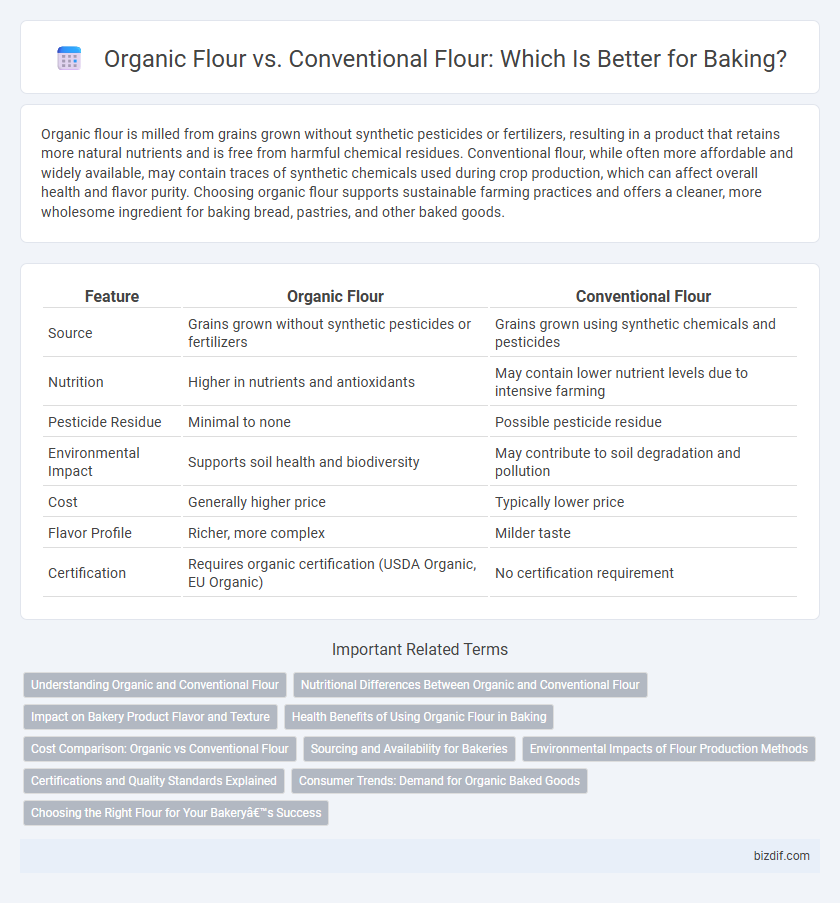Organic flour is milled from grains grown without synthetic pesticides or fertilizers, resulting in a product that retains more natural nutrients and is free from harmful chemical residues. Conventional flour, while often more affordable and widely available, may contain traces of synthetic chemicals used during crop production, which can affect overall health and flavor purity. Choosing organic flour supports sustainable farming practices and offers a cleaner, more wholesome ingredient for baking bread, pastries, and other baked goods.
Table of Comparison
| Feature | Organic Flour | Conventional Flour |
|---|---|---|
| Source | Grains grown without synthetic pesticides or fertilizers | Grains grown using synthetic chemicals and pesticides |
| Nutrition | Higher in nutrients and antioxidants | May contain lower nutrient levels due to intensive farming |
| Pesticide Residue | Minimal to none | Possible pesticide residue |
| Environmental Impact | Supports soil health and biodiversity | May contribute to soil degradation and pollution |
| Cost | Generally higher price | Typically lower price |
| Flavor Profile | Richer, more complex | Milder taste |
| Certification | Requires organic certification (USDA Organic, EU Organic) | No certification requirement |
Understanding Organic and Conventional Flour
Organic flour is milled from grains grown without synthetic pesticides, herbicides, or chemical fertilizers, resulting in a product free from genetically modified organisms (GMOs) and with higher levels of certain nutrients and antioxidants. Conventional flour, derived from grains cultivated with the aid of synthetic chemicals, often undergoes bleaching and enrichment processes that alter its natural nutrient profile. Understanding these differences helps bakers choose flour that aligns with health preferences, flavor profiles, and environmental considerations.
Nutritional Differences Between Organic and Conventional Flour
Organic flour contains higher levels of antioxidants, micronutrients, and essential minerals such as magnesium and zinc compared to conventional flour. It is free from synthetic pesticides and chemical fertilizers, which can impact nutrient retention negatively in conventional alternatives. Studies also show organic flour often has increased protein content and improved fatty acid profiles, contributing to better overall nutritional value.
Impact on Bakery Product Flavor and Texture
Organic flour, sourced from grains grown without synthetic pesticides or fertilizers, often retains more natural oils and nutrients that enhance the depth of flavor and contribute to a richer, nuttier taste in bakery products. Conventional flour, typically milled from grains treated with chemical inputs, may produce a more consistent but less complex flavor profile and a finer, lighter texture. The choice between organic and conventional flour directly impacts the aroma, crumb structure, and moisture retention, influencing the overall sensory experience of breads, cakes, and pastries.
Health Benefits of Using Organic Flour in Baking
Organic flour is grown without synthetic pesticides, herbicides, or genetically modified organisms, reducing exposure to harmful chemicals and promoting better health. It retains more natural nutrients and antioxidants compared to conventional flour, supporting improved digestion and immune function. Choosing organic flour in baking helps minimize the risk of allergies and sensitivities linked to chemical residues found in conventional flour.
Cost Comparison: Organic vs Conventional Flour
Organic flour typically costs 50-100% more than conventional flour due to higher production standards and certification fees. Conventional flour benefits from large-scale, industrial processing that reduces costs, making it more affordable for mass production and everyday baking. While the initial price of organic flour is higher, many bakers consider its health and environmental benefits when factoring the overall value.
Sourcing and Availability for Bakeries
Organic flour is sourced from grains grown without synthetic pesticides or fertilizers, often certified by organizations like USDA Organic, ensuring higher quality standards but limited crop yields. Conventional flour comes from grains cultivated with chemical inputs, providing more consistent availability and lower costs due to larger-scale, intensive farming practices. Bakeries aiming for organic products face challenges in sourcing steady supplies year-round, while conventional flour offers reliable stock and broader supplier networks.
Environmental Impacts of Flour Production Methods
Organic flour production minimizes environmental damage by avoiding synthetic pesticides and fertilizers, which reduces soil contamination and promotes biodiversity. Conventional flour often relies on chemical inputs that can lead to soil degradation, water pollution, and higher greenhouse gas emissions. Sustainable farming practices in organic flour cultivation contribute to improved soil health and decreased carbon footprint compared to conventional methods.
Certifications and Quality Standards Explained
Organic flour is certified by organizations such as USDA Organic and EU Organic, ensuring it meets strict standards for pesticide use, non-GMO ingredients, and environmentally sustainable farming practices. Conventional flour follows FDA regulations but lacks the comprehensive certification processes that verify organic integrity or eco-friendly production methods. Quality standards for organic flour emphasize soil health, biodiversity, and traceability, offering consumers guaranteed purity and enhanced nutritional benefits compared to conventional options.
Consumer Trends: Demand for Organic Baked Goods
Rising consumer awareness of health and environmental sustainability drives increased demand for organic flour in bakery products. Organic flour, free from synthetic pesticides and GMOs, appeals to customers seeking natural ingredients and superior nutritional value. This trend fuels bakery innovation, with many businesses expanding organic product lines to capture health-conscious markets.
Choosing the Right Flour for Your Bakery’s Success
Organic flour offers higher nutritional value and fewer pesticide residues, appealing to health-conscious customers and enhancing your bakery's marketability. Conventional flour provides consistent baking performance and often costs less, making it ideal for large-scale production and budget management. Selecting the right flour depends on your bakery's target audience, product quality goals, and operational priorities to ensure optimal success.
Organic flour vs Conventional flour Infographic

 bizdif.com
bizdif.com